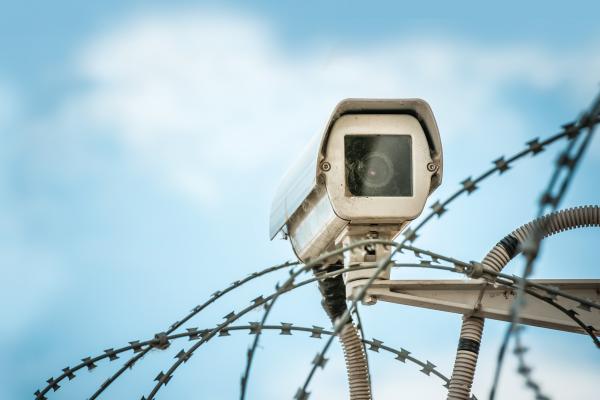There are pictures I could not take:
• The first: A cowboy leading his chestnut horse across the dewy pasture while a scrappy Jack Russell tugged the dangling rope and a black Lab-mix puppy leapt at its loops. All this was set just behind the ramshackle lake cabin where we stayed, between the lake, where morning fog rose off the waters and curled around cypress trees, and the barns.
• The second: Fifty men, maybe, lined up in work blues, shovels held high and straight in the air, faces focused on the rifle-toting man on horseback in front of them. This image landed between barracks and vegetable fields, and yet it could have been picked up and moved back in time. The men, the horse, the rifle would have looked the same set between the master’s plantation and the cotton that once grew here.
• The third: Four of us, alone in a chapel, thumbing through magazines, looking for the story one of the men with us wrote. We’re talking, listening, laughing. My colleague and I sit proper in pews, while the men stretch out before us on the chapel floor, catching rare-gotten rest, their ankles crossed, heads back, telling stories of their first days in this place. Harrowing, heartbreaking, and hilarious, in the way only time can weave them.
• The fourth: A panorama of a church, white and steepled at Camp D. Inside, the stage, packed with keyboards, guitars, mic stands, drums, musicians, preachers, and with those offering and those seeking prayer. The faces—white and black, bound and free—singing, praying, smiling, dancing. A picture of heaven, in this unlikely place.
• The final: All of us at this retreat for pastors, back in the chapel. We’ve spent two days together, getting to know one another, sharing stories, hearing scripture, singing, meditating, stilling our souls as my friend Dave sings “Slow Me Down,” searching for peace in the chaos we have in common. But now, we’re back to laughing. Our hosts—the pastors we’ve joined in their retreat—are remembering the picture of heaven at Camp D from the night before. But they’re mocking our dance moves. And we’re crying—laughing so hard—recognizing that teasing in love may be the surest sign of sister- and brotherhood in Christ.
These were the moments I longed to reach for my phone, snap a picture, shoot a video. But I didn’t. I couldn’t. Because I was at Louisiana State Penitentiary at Angola, a maximum-security prison.
The cabin, the lake, the pasture, the fields, the barns, the chapel, and the church were all on prison grounds. The cowboy, the blue-clad men, the men on the chapel floor, the musicians, and the pastors (well, except the ones I traveled with)—all inmates. All convicted, justly or unjustly, of heinous crimes—rape, kidnapping, murder: The sort that gets you sent away to a place like Angola. For life.
Taking pictures just seemed rude
And so, when several of us arrived at Angola to participate in an annual retreat for inmate-pastors that our pastor emeritus has led for years, a warden told us not to take pictures. To do so would require media releases. Red tape and bureaucratic hassles.
I balked. This was public land. That these men lived here was public knowledge. Pictures of prisoners on public land shouldn’t be forbidden. It was all me and my rights against men who’d lost theirs.
But then, the conversation with the cowboy. The men in (work) blue, lined up in the fields, and the chill of past and present shackled realities. The retreat, with its song, prayer, and laughter.
So when I saw the cowboy later, I didn’t pull out my phone. Because no longer did I see my rights, or prisoners on public land. Instead, I saw men at home, at work. I saw their humanity—our humanity—their private moments, their hearts. But most disturbing of all: I saw Jesus. And taking a picture just seemed rude.
A riff on the Imago Dei
In the passage on the sheep and the goats in Matthew 25:34-40, Jesus famously offers a riff on the Imago Dei (the image of God). When the righteous ask the king, “When did we see you sick or in prison and go to visit you?” the reply is, “Truly I tell you, whatever you did for one of the least of these brothers and sisters of mine, you did for me.”
Until the retreat with men who had gone through Angola’s innovative Bible seminary program and now served as pastors to their fellow inmates, I missed a major aspect of this passage. I’d glossed right over the key difference about visiting someone in prison. All the other people named in this parable—the hungry, the thirsty, the strangers, the naked, the sickly—they’re victims; they’re innocent, so to speak. Easy to see Jesus there. But the people in prison? They’re presumed to be the perpetrators, the ones potentially responsible for causing other people’s hunger or thirst or having to leave home or being naked or sick.
Of course, plenty of innocent folks sit in prison, and Jesus himself was condemned unjustly. But Jesus doesn’t say, “I was in prison for no reason and you came to visit me.” Just “I was in prison.”
When we visit prisoners, we visit Jesus.
It still disturbs me, all these months later.
One, I can’t stop thinking of the victims’ families. How horrifying it would be to read these words: A woman spends two days with men who killed or raped or hurt their beloved and goes declaring them Jesus. Nice.
And two, I realize my view is limited. And naïve. Angola famously is not like other prisons. Not that I’d know, actually, having only driven past others and seen the insides from documentaries. But it’s what I hear. Once a brutal and bloody prison, Angola’s former (and controversial) leaders sought to restore humanity, dignity, and hope to this place. And succeeded on some fronts, according to many prisoners. But even at Angola, with its swampy beauty, lush farm land, and thick woods, and even with its relative freedoms (inmate-cowboys with access to horses and tools without a guard in sight and being granted two free days for a pastors retreat, for instance) afforded to hard-working, well-behaved inmates, there are places where the darkness overwhelms. It’s still prison. And the men I didn’t meet—the ones who may shake and sputter and spew nonsense or hatred, the ones not sorry for their actions, not deemed “good enough” for any freedoms—still Jesus.
At least, according to Jesus.
And that’s messed up.
My flipped-up, messed-up faith
But the longer I live as a Christian, the longer I live into and try to live out my faith, the more I realize: It’s all messed up. Faith. Grace. The whole life-of-Jesus thing. That he messed everything up got him arrested and beaten and nailed to a cross. Messing everything up landed Paul in the horrific world of underground, dark and dank, rat-crap-filled Roman prisons. (No lake cabin, romps with puppies, and delicious breakfasts awaited visitors in Paul and Jesus’ day.)
But it’s because our faith is messed up, because it’s a flipped-upside-down one, because Christianity is nothing if not a holy paradox that we visit Jesus when we visit prison.
It’s not about being a do-gooder. Instead, it’s the truth and the heartbreaking beauty of something one of my new inmate friends said over gumbo: “It’s horrible being known by the worst thing you ever did.”
Indeed it would be. Indeed it is.
Truth told: If this man had hurt my child, I’m not sure I’d have the grace to hear this and not be able to say, “Good. I hope it’s worse than horrible.”
But at that lunch table, my flipped-up, messed-up faith took hold and I saw Jesus.
How could I not? How could I benefit from the messed-up grace of God that allows me to be seen by God on high not as a horrible sinner full and capable of every last deadly sin but as a beloved child and not see others differently myself? It’s messed up, but it’s true.
It’s impossible to laugh, pray, and sing old gospel songs with men who’ve raped and murdered, who’ve sold drugs to children, carjacked strangers, shot girlfriends, buried bodies in woods and not see grace.
I could not look at lines of incarcerated men, ready for a day’s work under the gun (literally), and not shudder at past (and sometimes present) atrocities and injustices. And yet, I could only hope for redemption for this land that no longer grows cotton and for these men who no longer have freedom.
And there’s no way I could rub puppies’ tummies while talking to an inmate-cowboy about dogs, to hear him tell me lots of guys here are like pit bulls because they think they’re tough, but that those guys don’t know—“They’re just silly snuggle bugs,” he says—and me not feel the peace of Christ descend.
I don’t know why. I don’t know how. I just know it’s true: When we visit prisoners, we visit Christ. All during my time in Angola, I saw Jesus everywhere.
I stopped seeing inmates, men who’d done horrible things. Instead, I saw the eyes of the one who paid it all—so that we no longer have to spend an eternity being known by the worst thing, or the even the collection of little horrible things, we’ve done. Instead we get the hope of being known forever in the same way I know these men, as they know me: messed up, “broken,” forgiven, beloved by God, set free by Jesus.
It’s another picture I could not take: that of grace.

Got something to say about what you're reading? We value your feedback!

